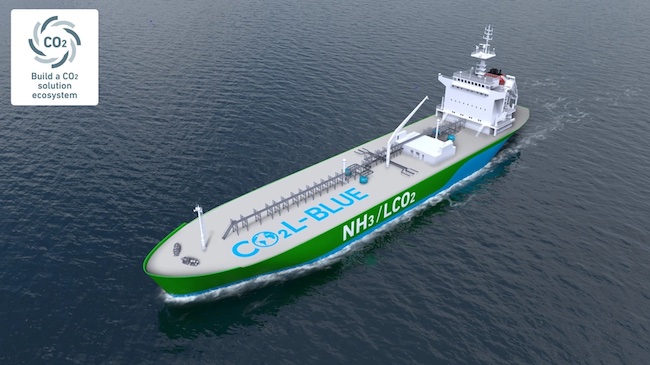|
|
|
|
|
|
- Response to Increasing Demand for Transport of Ammonia and LCO2 -
- Conduct a type of vessel of an "Ammonia/Liquefied CO2 Carrier" on the basis for a type of vessel with potential to become mainstream in the LCO2 carrier market.
- Vessel to transport ammonia on the outbound journey and LCO2 on the return voyage, aiming for commercial production based on acquired knowledge and technical issues. |
TOKYO, Apr 19, 2022 - (JCN Newswire) - Mitsubishi Shipbuilding, a part of Mitsubishi Heavy Industries (MHI) Group based in Yokohama, has completed a conceptual study for the design of an "Ammonia/Liquefied CO2 Carrier" capable of transporting both ammonia and liquefied carbon dioxide (LCO2). The extensive study conducted with Mitsui O.S.K. Lines, Ltd. provides the basis for a type of vessel with potential to become mainstream in the LCO2 carrier market by flexibly meeting the projected increase in demand for transporting ammonia and LCO2.
 | | Image of "Ammonia/Liquefied CO2 Carrier" |
Ammonia is a source of stable clean energy projected to be used widely in the future, and LCO2 carriers play an important role in the carbon dioxide capture, utilization, and storage (CCUS) value chain, which is attracting attention as a means to achieve a decarbonized world, by providing a way to efficiently transport recovered LCO2 to storage sites and facilities for effective utilization. MHI Group estimates that the volume of CO2 reduction due to CCUS will amount to 4.3 to 13.0 billion tonnes annually by 2050.
The vessel for transporting ammonia and LCO2 developed through this conceptual study is designed to carry ammonia on its outward journey, and LCO2 on the return trip. Specific carriers for each material normally run empty on their return voyage, so a ship able to handle both substances will increase operational efficiency, and contribute to enhanced transport efficiency overall.
Mitsubishi Shipbuilding will continue to further develop the technology based on the knowledge acquired and technical issues encountered through this project, and in cooperation with marine-related corporations and petroleum development corporations, aims to commercialize the vessel. In addition, considering the entire value chain, Mitsubishi Shipbuilding will continue to develop various types of ships based on this design in order to respond flexibly to customer needs.
As an integral part of MHI Group's energy transition strategy, Mitsubishi Shipbuilding has established the MARINE FUTURE STREAM vision for 2050 in the ship and marine sector, setting the goals of "a decarbonized marine world" through autonomous operation and electrification, and "effective utilization of the marine space" through renewable energy and the carbon cycle, and working to generate and implement ideas for marine-related innovation. Going forward, as a marine systems integrator, Mitsubishi Shipbuilding will continue to actively develop and commercialize LCO2 carriers, build a CCUS value chain spanning land and sea, and strive to realize a decarbonized world.
About MHI Group
Mitsubishi Heavy Industries (MHI) Group is one of the world's leading industrial groups, spanning energy, logistics & infrastructure, industrial machinery, aerospace and defense. MHI Group combines cutting-edge technology with deep experience to deliver innovative, integrated solutions that help to realize a carbon neutral world, improve the quality of life and ensure a safer world. For more information, please visit www.mhi.com or follow our insights and stories on spectra.mhi.com.
Topic: Press release summary
Source: Mitsubishi Heavy Industries, Ltd.
Sectors: Transport & Logistics, Energy, Alternatives, Marine & Offshore
https://www.acnnewswire.com
From the Asia Corporate News Network
Copyright © 2026 ACN Newswire. All rights reserved. A division of Asia Corporate News Network.
|
|
|
|

|
|
|
|